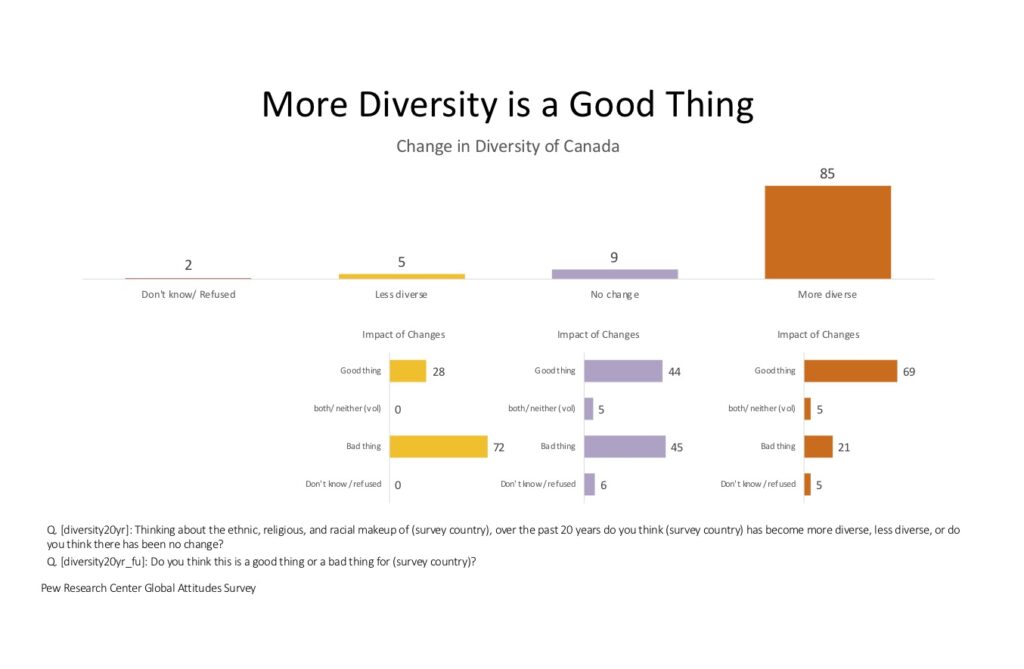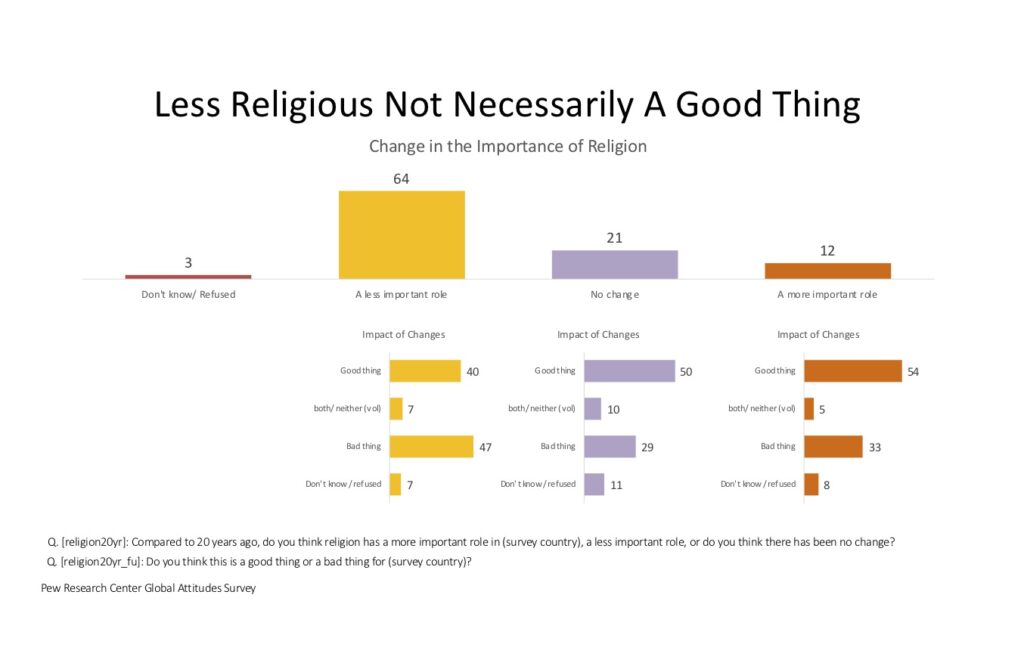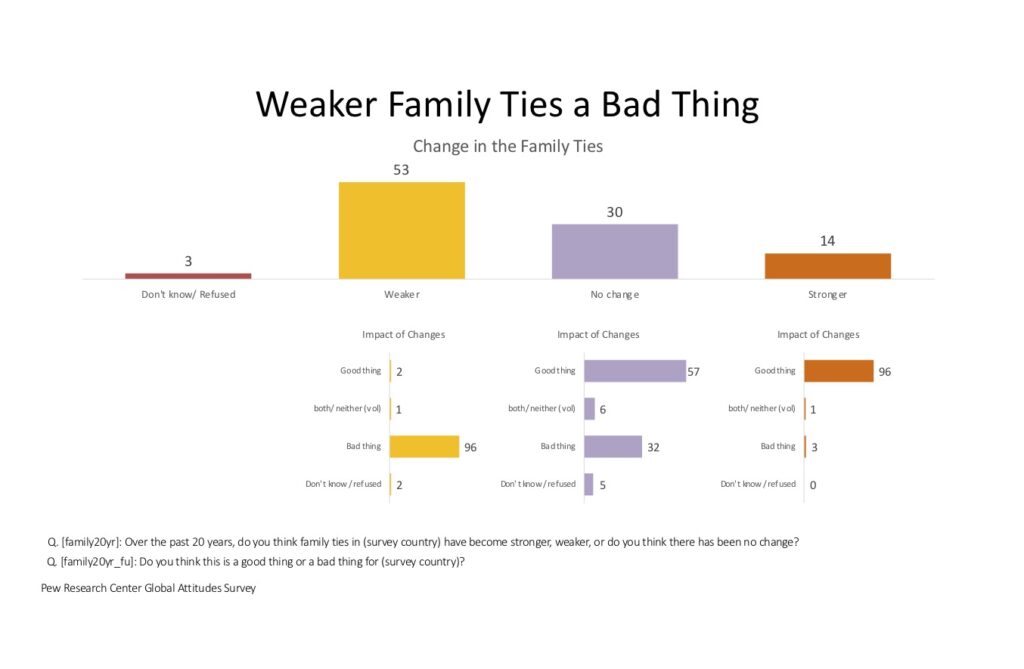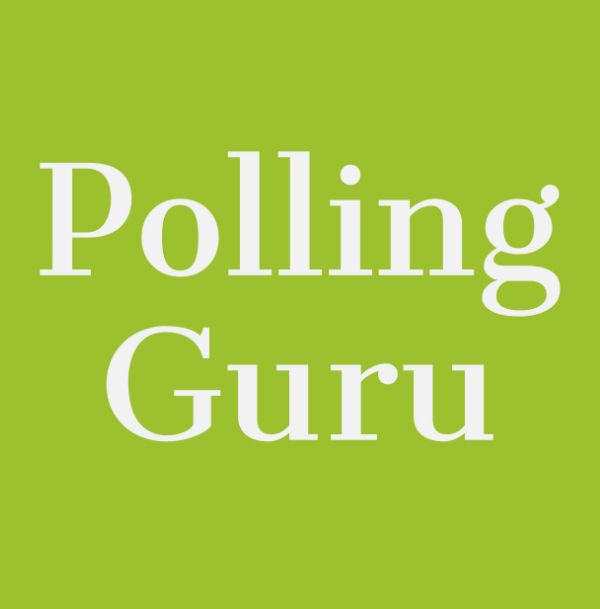A lot of culture change has occurred in the past 20 years. Last year, the Pew Research Center asked Canadians to reflect on these changes. Many of the observations are obvious, but how Canadians see these changes is important. There is an undercurrent of lament for a better past apparent in the findings.
In short, Canada is more diverse, less religious, more gender equal and with weaker family ties. Not all of us are happy about that.
Diversity in Canada
More than eight in ten think Canada has become more diverse in the past 20 years. Overall 65% think the changes over the past 20 years has been a good thing for Canada. One in four think the changes have been a bad thing.
Of course, we are particularly interested in how people who say we are more diverse evaluate the change. Are people who think we are more diverse happy with what has happened? The answer, yes. Almost 7 in 10 (69%) of those who think we have become more diverse say the change is good. There are some 21% who think it is a bad thing.
This is important because of the potential for ethnocultural issues to emerge and shape politics. This was central to the Reform Party in the early 90s and more recently the anti-immigrant views of the People’s Party. Could this culture change fuel a new backlash?

Declining Importance of Religion
There is also considerable agreement about changes to religious importance in Canada. Sixty-four per cent think religion has a less important role. Only 12% think religion has become more important. Overall, 44% think this culture change is a good thing. Forty-one per cent, however, think it is a bad thing.
Among those who think religion has a less important role in Canada, more (47%) think this is a bad thing than a good thing (40%). For those who don’t think the role of religion has changed, 50% think this is a good thing.
As Canada feels like a fairly secular society the fact that three in ten people think that religion has become less important and this is a bad thing is interesting. This is an underlying cleavage that does not get well represented in political discourse except in Quebec.

Weakening of Family Ties
While not as obviously political like religion and diversity, perceptions of family ties gives us a window on attitudes about culture change. Just over half of Canadians think family ties have gotten weaker over the past 20 years. only 14% think that ties are stronger now.
Overall 63% think the changes are a bad thing. But among those who see weaker ties, 96% think the change has been a bad thing. Almost half of Canadians think ties have weakened and that it is a bad thing.
Is this nostalgia or a real feeling of loss about the role of family? It is hard to say but there is no question that it reflects a strong lament for better times. And, importantly, many politically charged social issues touch on notions of family. Consider abortion, same-sex marriage and even issues like physician assisted suicide and prostitution can be linked in people’s minds to the decline in the traditional family.

The Implications of Culture Change
A lot of culture change has occurred over the past 20 years. On these indicators, there is more support for the view that diversity and gender equality (not shown) that there has been change. And, for most people that change is positive. Of course, there are some that think these changes are a bad thing. In the case of diversity more than one in five who think there is more diversity also believe the change is negative. This is an obvious constituency for anti-immigrant/ anti-refugee messages. While Canada has largely been immune to serious backlash, under the surface these issues do exist for people.
Religion and family ties represent somewhat less political cultural changes. Here there is less consensus of the change though clearly the majority think that religion now plays a less important role and that family ties are declining. For those that see change, more view these changes negatively. This is especially true for the decline in family ties.
Culture change has inevitably produced a longing for a traditional past that, at least for some, was better. This forms an important backdrop in which questions of political support will manifest themselves.
Pew Research Center Global Attitudes Survey 2018. Survey was conducted by telephone between May 23 and June 21, 2018.

